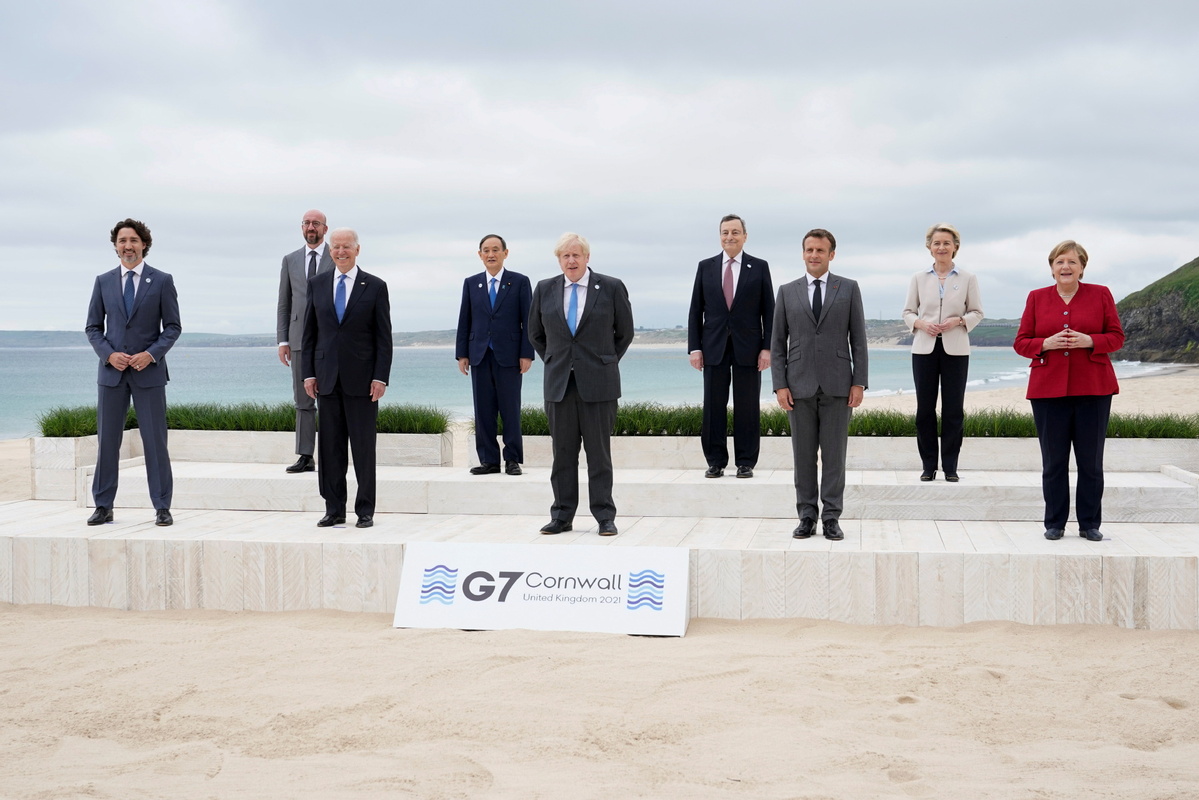G7 summit fails to 'meet the challenges'
By ANGUS MCNEICE in London | China Daily Global | Updated: 2021-06-16 10:15
Agreements on climate, COVID vaccine help for poorer nations described as inadequate

When United Kingdom Prime Minister Boris Johnson traveled from London to Cornwall to usher in a "better, fairer, greener" future at the G7 summit over the weekend, he did so by airplane.
The irony of talking about climate change after burning through aviation fuel on a short-haul domestic flight was not lost on observers on social media. Now that the summit is over, the well-publicized image of Johnson emerging from a chartered jet at Newquay Airport may be seen as demonstrative of what observers described as a wider hypocrisy that typified the event.
At the summit, leaders from the group of wealthy countries called for the global phasing out of both coal power and automobiles that run on fossil fuels, without unanimously committing to their own national deadlines. French climate expert Laurence Tubiana told the BBC that such an agreement amounted to "a plan to make a plan".
The G7 nations, several of which sit upon their own giant stockpiles of COVID-19 vaccines, promised more equitable distribution of treatments in the developing world and announced combined donations of 1 billion doses this year to poorer regions.
Former UK prime minister Gordon Brown called the number "headline grabbing" but woefully inadequate to achieve Johnson's pre-summit promise of global vaccine coverage by next year.
"When we needed 11 billion vaccines, we've only got offered a plan for 1 billion," Brown told Sky News. "I think this summit will also go down as an unforgivable moral failure, when the richest countries are sitting around the table with the power to do something about it. Now that we've discovered the vaccine, we have not delivered the comprehensive plan that will deliver vaccination by the middle of next year."
World Health Organization Director-General Tedros Adhanom Ghebreyesus noted that while a commitment to donate vaccines is commendable, it does not amount to much if the actual supply falls short.
So far, just 85 million vaccine doses have been delivered to the developing world by COVAX, the international vaccine campaign co-led by the World Health Organization and its partners-well below the target of 252 million for the first half of the year.
"Share doses now, not later in the year, when our need is greatest," Tedros said on Sunday.
Max Lawson, head of inequality policy at the charity confederation Oxfam, said that the G7 summit will "live on in infamy" and that "never in the history" of the G7 has there been a bigger gap between the group's actions and the needs of the world.
"Faced with the biggest health emergency in a century and a climate catastrophe that is destroying our planet, they have completely failed to meet the challenges of our times," Lawson said. "In the face of these challenges the G7 have chosen to cook the books on vaccines and continue to cook the planet. We don't need to wait for history to judge this summit a colossal failure; it is plain for all to see."
For Johnson, the summit was a chance for post-Brexit "global Britain" to emerge as a world leader on solutions to mutual global threats. Instead, bitter disputes erupted with his European counterparts over the UK's apparent desire to renege on Northern Ireland trade regulations laid out in the European Union withdrawal agreement.
European leaders then denied the White House its wish to unify the G7 in "strategic competition" with China on a range of issues.
German Chancellor Angela Merkel told reporters: "We need everyone in the world to work together, especially in the areas of climate protection and biodiversity. We will never achieve solutions there without China."
The G7 leaders did sign on to a US-backed infrastructure investment plan for the developing world. The Build Back Better World, or B3W, was presented as an alternative to the China-proposed Belt and Road Initiative, which has picked up its pace since its introduction in 2013, with over 130 countries now formally affiliated. In its statement on the new program, the White House provided no investment figures and few details as to how the plan will be implemented.
Martin Jacques, a former senior fellow at the Department of Politics and International Studies at Cambridge University, said he is doubtful of the program's chances for success.
"The idea that the G7 could create a serious alternative to Belt and Road is pure fantasy," Jacques said on Twitter. "The West is mired in debt. They haven't got a clue how to do it. They don't believe in offering this kind of help to developing countries. They have bad-mouthed Belt and Road ever since 2013."
























